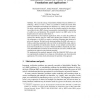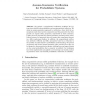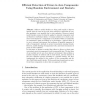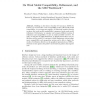143
Voted
TACAS
2010
Springer
15 years 2 days ago
2010
Springer
Abstract. We extend the setting of Satisfiability Modulo Theories (SMT) by introducing a theory of costs C, where it is possible to model and reason about resource consumption and ...
105
click to vote
TACAS
2010
Springer
15 years 2 days ago
2010
Springer
The choice of where a thread scheduling algorithm preempts one thread in order to execute another is essential to reveal concurrency errors such as atomicity violations, livelocks,...
154
click to vote
TACAS
2010
Springer
15 years 2 days ago
2010
Springer
Abstract. We present a compositional verification technique for systems that exhibit both probabilistic and nondeterministic behaviour. We adopt an assume-guarantee approach to ver...
116
Voted
TACAS
2010
Springer
15 years 2 days ago
2010
Springer
Software model checkers are being used mostly to discover specific types of errors in the code, since exhaustive verification of complex programs is not possible due to state explo...
139
click to vote
TACAS
2010
Springer
15 years 2 days ago
2010
Springer
Systems and protocols combining concurrency and infinite state space occur quite often in practice, but are very difficult to verify automatically. At the same time, if the system ...
113
click to vote
TACAS
2010
Springer
15 years 2 days ago
2010
Springer
Abstract. Intermediate languages are a paradigm to separate concerns in software verification systems when bridging the gap between programming languages and the logics understood ...
117
Voted
TACAS
2010
Springer
15 years 17 days ago
2010
Springer
We introduce JTorX, a tool for model-driven test derivation and execution, based on the ioco theory. This theory, originally presented in [12], has been refined in [13] with test-...
101
click to vote
TACAS
2010
Springer
15 years 7 months ago
2010
Springer
We propose a general methodology for approximating the Pareto front of multi-criteria optimization problems. Our search-based methodology consists of submitting queries to a constr...
150
Voted
TACAS
2010
Springer
15 years 9 months ago
2010
Springer
We study the model checking problem of timed automata based on SAT solving. Our work investigates alternative possibilities for coding the SAT reductions that are based on parallel...
106
Voted
TACAS
2010
Springer
15 years 9 months ago
2010
Springer




